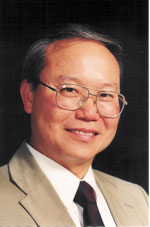Prof. Foo Yew Liew
International Awards
Hamdan Award for Medical Research Excellence
- Pathogenesis and Therapy of Autoimmune Disorders
2001-2002
Professor Foo Yew Liew was born in 1943 in Malaysia but has a British nationality. He graduated and obtained his PhD from Australia. He is renowned for his contribution to the concept of T cell subsets and their role in infection and autoimmune diseases. He is Gardiner Professor of Immunology at the University of Glasgow, UK.
He is also the Director of the Glasgow Biomedical Research Centre, which is dedicated to fundamental research on the cause of disease and the translation of this knowledge to clinical practice. Professor Liew is a Fellow of the Royal Society of Edinburgh and a Fellow of the Academy of Medical Science.
He obtained his BSc degree in Chemistry from the Monash University in Melbourne, Australia, and then PhD in Immunology from the John Curtin School of Medical Research, Australian National University, Canberra, Australia.
In the early 70's Professor Liew made a seminal contribution to the concept of the heterogeneity of CD4+ T cells by demonstrating that CD4+ T cells mediating delayed-type hypersensitivity and those helping antibody synthesis are distinct.
This finding laid the foundation for the current understanding of Th1 and Th2 cells, the balance of which frequently determines the outcome of infection and autoimmune diseases. He then went on to pioneer the research on the immune response to Leishmaniasis by demonstrating that there are two distinct populations of CD4+ T cells provoked by the infection: one host protective, the other disease promoting. These cell types turned out to be the prototype of Th1 and Th2 cells, respectively. This finding inspired active research in Leishmaniasis, making it arguable the best understood parasitic disease. In 1995, using the then novel gene-targeting technology, Professor Liew's laboratory was one of the first to demonstrate that inducible nitric oxide was essential for the host protection against intracellular infection. Moreover, they showed that over production of nitric oxide could be responsible for the pathology of a range of autoimmune diseases, including rheumatoid arthritis (RA) and system lupus erythematosus (SLE). More recently, Professor Liew's team demonstrated that Interleukin 15 and 18 are closely associated with the pathogenesis of RA and SLE. More importantly, using gene targeting and recombinant soluble cytokine receptors, they showed that blockage of IL-15 and IL-18 profoundly attenuated on-going inflammatory synovitis. They also showed that IL-15 and IL-18 induced the pathology in RA through the elevation of proinflammatory cytokines such as TNFα, IFNγ and IL-6 in a cell-contact-dependent manner. This opened up the possibility of therapeutic intervention in a range of inflammatory diseases. A Phase I clinical trial of a human anti-human IL-15 antibody against RA has just been concluded and the results strongly indicate that anti-IL-15 antibody is potentially a powerful therapeutic agent against RA. A Phase II trial is to begin in November 2002. In summary, Professor Liew has made a seminal contribution to our understanding of the heterogeneity of T cells and their effects on health and disease. His unique findings in infection and autoimmune disease have enabled the design of novel therapeutic agents against a range of inflammatory diseases. He has 200 publications, 196 referreed papers, 65 invited reviews and 2 books which are Vaccination Strategies of Tropical Diseases in 1989 and Chemical Immunology: Immunology of Intracellular Parasitism in 1998. He is a member of several committees and advisory boards and editorial boards too. Therefore, he is truly worthy of being awarded, for his outstanding contributions to the understanding of the fundamental aspects of the immune response, the Hamdan Award for Medical Research Excellence.

